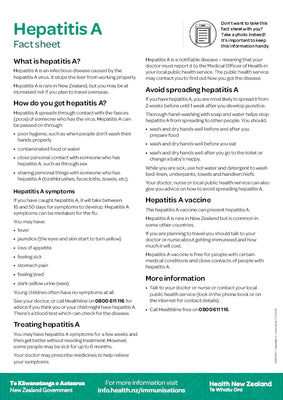Hepatitis A - Factsheet - NIP8990

Flyer giving information about Hepatitis A, including how you get it, how it can be treated, and immunising to prevent infection.
The full resource:
What is hepatitis A?
Hepatitis A is an infectious disease caused by the hepatitis A virus. It stops the liver from working properly.
Hepatitis A is rare in New Zealand, but you may be at increased risk if you plan to travel overseas.
How do you get hepatitis A?
Hepatitis A spreads through contact with the faeces (poos) of someone who has the virus. Hepatitis A can be passed on through:
- poor hygiene, such as when people don’t wash their hands properly
- contaminated food or water close personal contact with someone who has hepatitis A, such as through sex
- sharing personal things with someone who has hepatitis A (toothbrushes, facecloths, towels, etc).
Hepatitis A symptoms
If you have caught hepatitis A, it will take between 15 and 50 days for symptoms to develop. Hepatitis A symptoms can be mistaken for the flu. You may have:
- fever
- jaundice (the eyes and skin start to turn yellow)
- loss of appetite
- feeling sick
- stomach pain
- feeling tired
- dark-yellow urine (wee).
Young children often have no symptoms at all.
See your doctor, or call Healthline on 0800 611 116 for advice if you think you or your child might have hepatitis A. There’s a blood test which can check for the disease.
Treating hepatitis A
You may have hepatitis A symptoms for a few weeks and then get better without needing treatment. However, some people may be sick for up to 6 months.
Your doctor may prescribe medicines to help relieve your symptoms.
Hepatitis A is a notifiable disease – meaning that your doctor must report it to the Medical Officer of Health in your local public health service. The public health service may contact you to find out how you got the disease.
Avoid spreading hepatitis A
If you have hepatitis A, you are most likely to spread it from 2 weeks before until 1 week after you develop jaundice.
Thorough hand-washing with soap and water helps stop hepatitis A from spreading to other people.
You should:
- wash and dry hands well before and after you prepare food
- wash and dry hands well before you eat
- wash and dry hands well after you go to the toilet or change a baby’s nappy. While you are sick, use hot water and detergent to wash bed-linen, underpants, towels and handkerchiefs.
Your doctor, nurse or local public health service can also give you advice on how to avoid spreading hepatitis A.
Hepatitis A vaccine
The hepatitis A vaccine can prevent hepatitis A.
Hepatitis A is rare in New Zealand but is common in some other countries.
If you are planning to travel you should talk to your doctor or nurse about getting immunised and how much it will cost.
Hepatitis A vaccine is free for people with certain medical conditions and close contacts of people with hepatitis A.
More information
- Talk to your doctor or nurse or contact your local public health service (look in the phone book or on the internet for contact details).
- Call Healthline free on 0800 611 116.